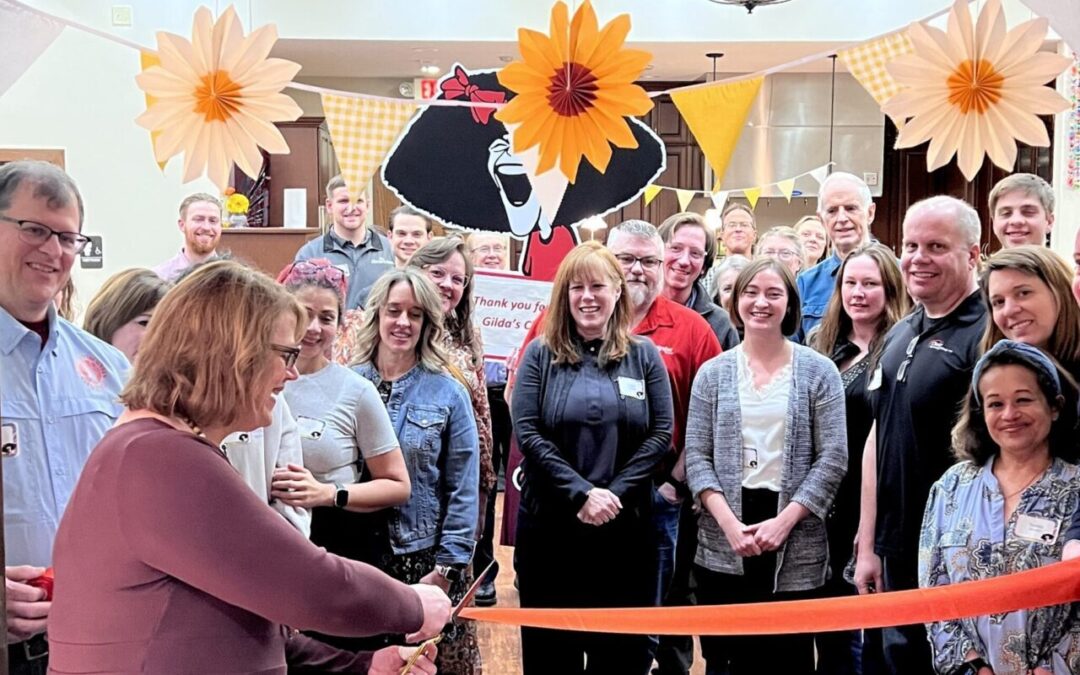
by Tiana Snyder | Jan 17, 2025 | Solar, Solar for Good
On Monday, January 13, Gilda’s Club Madison invited representatives from RENEW Wisconsin, Couillard Solar Foundation, Only in Wisconsin, Glow Solar, and their members to join in the celebration of a monumental achievement. Gilda’s Club with the help of its supporters installed a solar array that will offset 100% of its electrical usage.
Gilda’s Club was established in 1991 to honor the late comedian, Gilda Radner, with a mission to uplift and strengthen people who are impacted by cancer by providing support, fostering compassionate communities, and breaking down barriers to care. In 2008, Gilda’s Club Madison opened its doors to the Wisconsin community, becoming one of many worldwide affiliates. Over the years, the organization has been a foundational resource for its members in providing free counseling services, social events such as a brunch club, field trips across Dane County, equestrian therapy, and more.
Glow Solar installed a 31.4-kilowatt solar system. John Reinders, President of Glow Solar shared, “At Glow Solar, we love working with non-profits to design and implement renewable energy solutions that fit their individual goals. In the case of Gilda’s Club, we helped them design and install a system that will meet their goals to offset 100% of their annual electric usage, look great on their building, and continue to serve their clients without worrying about escalating energy costs. The grants from Focus on Energy and Solar for Good help make it a great time for non-profits like Gilda’s Club to pursue their renewable energy goals.”
For many, going solar is a viable opportunity to continue helping their members thrive without having to reduce support for their mission. With the availability of direct pay incentives for nonprofits, organizations like Gilda’s Club Madison are able to enhance their sustainability initiatives and focus more funding toward their mission by going solar. In addition to taking advantage of federal and state funding, the solar project also received support from BIOFerm, Only in Wisconsin (the charitable arm of New Glarus Brewing Company), and Solar for Good, a program funded and founded by the Couillard Solar Foundation and managed by RENEW Wisconsin.
In reflecting on the long-term impact solar will have on their community, the CEO of Gilda’s Club Madison, Lannia Stenz shared, “We are thrilled to install solar panels at Gilda’s Club Madison, taking a meaningful step toward sustainability and reducing our environmental footprint! This project is a testament to the power of community—thank you to Solar for Good and everyone who made this possible. Your support not only brightens our future but also ensures that Gilda’s Club can continue offering vital resources to those facing cancer, free of charge, for many years to come.”
Beyond solar serving as a responsible financial decision, it’s also an investment in the health and sustainability of Wisconsin communities. In the case of Gilda’s Club Madison, their decision to go solar contributes to cleaner air by reducing carcinogenic air pollutants and offers a promise to their members that they can continue providing support to families and individuals living with cancer. This celebration serves as an important reminder for Wisconsin that when mission-driven organizations, residents, and businesses collectively make an investment in clean energy, they are also making a direct investment into their communities.
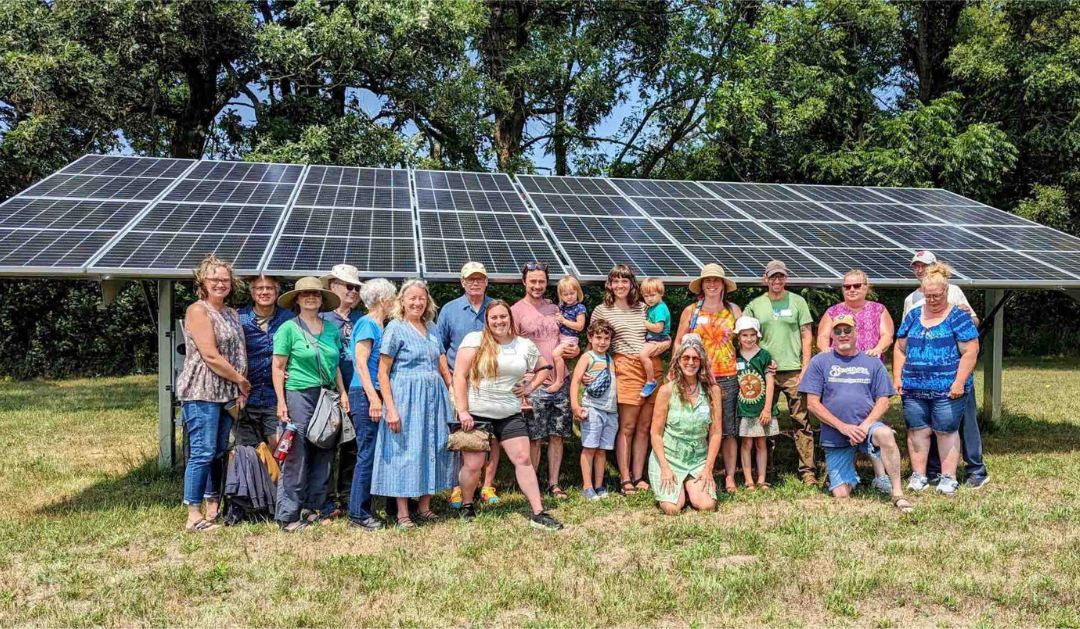
by Tiana Snyder | Nov 21, 2024 | Press Release, RENEW Wisconsin, Solar, Solar for Good
The Solar for Good grant program has awarded over $220,000 in grants and solar panel donations to Wisconsin nonprofit organizations for the Fall 2024 grant round. The 14 nonprofits will install 16 projects for a total of 1,000 kilowatts of solar electricity, leading to more than $2.3 million in renewable energy investments in Wisconsin.
The following organizations have been awarded Fall 2024 Solar for Good grants to install new solar energy
systems:
CAP Services, Inc. – community service, Stevens Point
COULEECAP, Inc. Hillcrest Manor – affordable housing, Ontario
COULEECAP, Inc. REACH – community service, La Crosse
EAGLE School of Madison – education, Fitchburg
Family and Children’s Center – community service, La Crosse
Family Services of Southern Wisconsin and Northern Illinois, Inc. – community service, Beloit
Holy Spirit Parish – house of worship, Stevens Point
Hunger Task Force – community service, West Milwaukee
Ozaukee Food Alliance – community service, Saukville
Recreation and Fitness Resources Center – recreation, Bayfield
Union Congregational United Church of Christ – house of worship, Green Bay
VIA CDC – affordable housing, Milwaukee
West Central Wisconsin Community Action Agency – affordable housing, Hudson
*One organization has asked to remain anonymous.
The grant recipients from the Fall 2024 grant round are a diverse range of organizations, representing affordable housing organizations, schools, and houses of worship. Each facility’s solar project will have a significant impact on their budgets, and will allow them to focus more funds on their missions. Holy Spirit Parish will install 90 panels atop their place of worship in Stevens Point, Family Services of Southern Wisconsin will incorporate 69.6kW of solar to their rooftop, and VIA CDC will install solar systems of 5.33 kilowatts on three housing projects in Milwaukee.
“We are thrilled and deeply grateful for this opportunity through RENEW Wisconsin’s Solar for Good initiative. This support allows us to further our mission with VIA’s Turnkey Program and new construction housing, making a lasting, positive impact on our community through sustainable energy,” said JoAnna Bautch, Executive Director at VIA CDC.
Similarly, the Solar for Good grant will allow Family Services of Southern Wisconsin and Northern Illinois to continue serving families in need by reducing operational costs and allocating more funding to programming.
“This funding has allowed us to equip our Next Steps Family Resilience Center with solar power that will be vital to the long-term sustainability of this programming for unhoused parents with young children while also contributing to a healthier community overall,” said Kelsey M. Hood-Christenson, President and CEO, of Family & Children’s Services of Southern Wisconsin and Northern Illinois.
Since 2017, Solar for Good has awarded grants to over 200 nonprofits across Wisconsin, leading to more than $29.4 million of renewable energy investments in the state. Collectively, Solar for Good grant recipients will go on to install more than 10 megawatts of solar energy.
“We are most grateful to the Couillard Solar Foundation for awarding us half the solar panels we need for installation of our solar array at Holy Spirit Parish in Stevens Point,” said Susan Zach Burns, Solar Project Lead of Holy Spirit Parish. “By reducing our reliance on fossil fuel and turning to solar for a good share of our energy needs, we are joining with you and others to address greenhouse gas emissions and to care for our common home, our beautiful Earth.”
“Our congregation has been energized literally and figuratively by our solar installation and our grant from Solar for Good. Not only will our installation reduce the carbon footprint of our church, it has inspired our members to invest in solar and other climate-friendly initiatives as well,” said Reverand Bridget Flad Daniels, Union Congregational UCC of Green Bay.
Through the assistance from Solar for Good grants, these 16 installations will accelerate Wisconsin’s transition to solar energy, facilitating the expansion of environmental stewardship and energy savings. As Solar for Good looks ahead to future grant rounds, the program will remain committed to supporting nonprofits and houses of worship across the state of Wisconsin by supporting organizations in their efforts to contribute to a positive environmental impact, enhance economic advancement in Wisconsin, and strengthen their ability to aid the communities they serve.
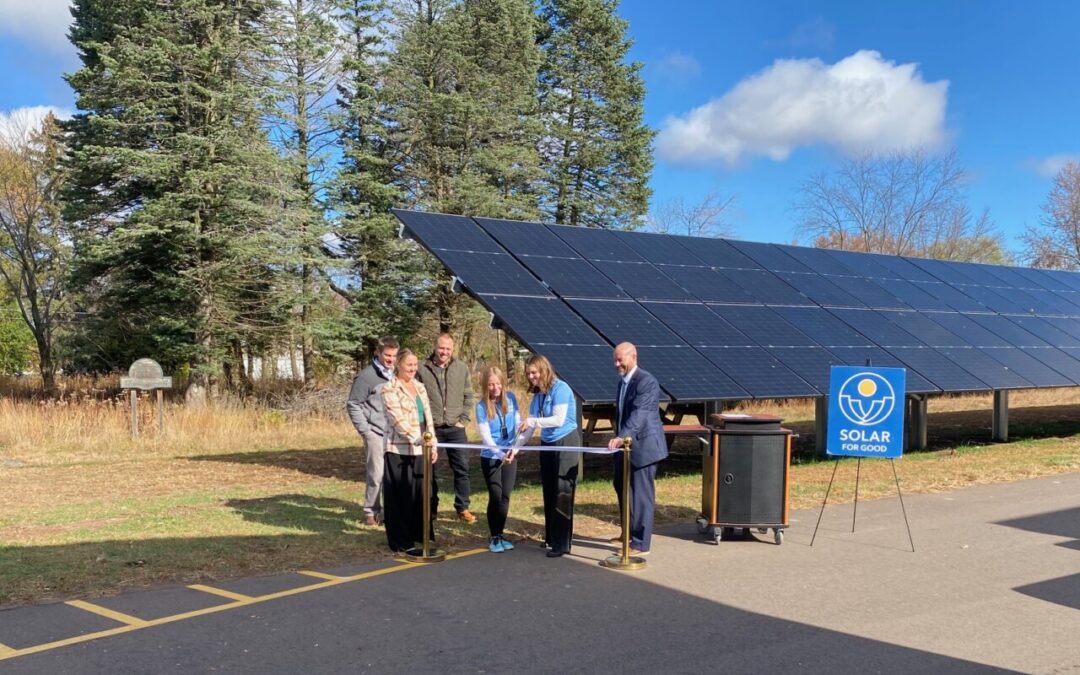
by Tiana Snyder | Nov 11, 2024 | Solar, Solar for Good
On Friday, November 1, Cooperative Education Services Agency 10 (CESA 10) celebrated the completion of its new 124.2-kilowatt solar array during their ribbon-cutting ceremony. Member school districts, Solar Connection, the Green Team, Couillard Solar Foundation, and RENEW Wisconsin joined the event to celebrate this significant milestone. The organization’s commitment to energy efficiency and sustainability in education sets a strong example for school districts and surrounding communities on the benefits of renewable energy and how they can go solar too.
Solar Connection installed a ground-mount solar system consisting of 235 solar panels with 115 panels secured through the Solar for Good grant program. The solar system is set to offset the organization’s electrical consumption by approximately 75%. The successful installation of this project was made possible through dedicated support from the CESA 10 team and support from funding sources. Additionally, the team took advantage of federal and state incentives including the Inflation Reduction Act and Focus on Energy.
Serving 29 school districts and more than 36,000 students, CESA 10 plays a crucial role in offering educational programs and services, ranging from college readiness programs to educational technology and facilities management. Choosing to go solar reflects a key part of their mission in helping schools reduce operational costs so that greater resources can be allocated to enriching the educational experience of students. Its new solar array will not only reduce its own operational costs, but also demonstrate to educators, students, and the broader community the long-term benefits of clean renewable energy.
Going solar is the latest step in CESA 10’s broader sustainability initiatives, but their journey into greater energy efficiency began several years ago. In recent years, they have also undertaken several energy efficiency upgrades including adding LED lighting, improving installation, and replacing roofs of its facilities. Each efficiency upgrade adds up to have a significant positive impact, including lower operating costs and a smaller carbon footprint. With the solar panels recently commissioned, the organization consistently plans to work towards further energy improvements.
Through their efforts, CESA 10 is not only benefiting their own facility but also contributing to a future where solar energy plays a larger role in Wisconsin’s schools. As a leader in showcasing the tools accessible to educators, this project encourages others to consider how they can explore clean energy solutions to enhance their efforts in serving students and having a positive environmental impact.
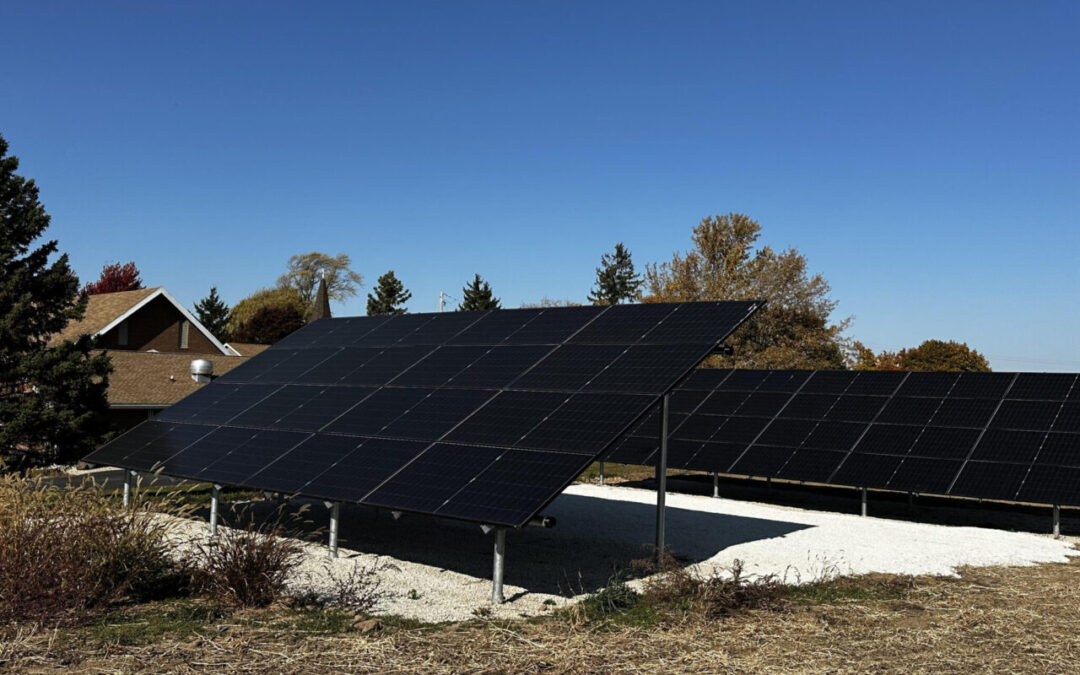
by Tiana Snyder | Oct 26, 2024 | Solar, Solar for Good
On October 20, 2024, Sugar Creek Lutheran Church opened its doors to welcome congregation members, nonprofit leaders, and representatives from other houses of worship to explore its new solar system. The new 19.6-kilowatt solar system is set to exceed the church’s current electrical needs by 14%. These savings will allow Sugar Creek Lutheran Church to continue supporting its congregation, provide scholarships to students pursuing higher education, and provide additional community programming.
The open house featured a tour of its new solar installation, a presentation provided by Solar Project Lead Ervin Schlepp, and materials that outline a step-by-step guide for how other community members and fellow nonprofits can switch to solar energy.
Established in 1849, Sugar Creek Lutheran Church has been a leader and innovator for the Elkhorn community by providing various programs, including a ‘food in backpacks’ meal service program for two schools, and scholarships for students to further their education. The church’s mission “to witness Christ’s love, presence and acceptance with and for all people” is the foundation of the work they do to ensure a positive well-being for the Elkhorn community.
As they approached their 175th anniversary, leadership of the church began to deeply consider how they could further impact the community while also excelling in care for the planet. The congregation’s strong connection to the rural land that the church is situated on drove the church’s desire to explore how Sugar Creek Lutheran Church could enhance its energy efficiency. The solar project team identified incentives including the Inflation Reduction Act 30% tax credit and Focus on Energy, which could help make the transition to solar energy a practical and feasible option. Grant programs further assisted Sugar Creek Lutheran Church in transitioning to solar by greatly reducing the upfront costs of installing the array.
Sugar Creek Lutheran Church contracted a local solar installer company, Adam’s Electric, to install 36 panels. Generous donations from the congregation, in addition to significant grants from the Couillard Solar Foundation and Hammond Climate Solutions Foundation facilitated the development of this project. Through the Solar for Good initiative, Couillard Solar Foundation provided half of the panels needed for the project, and the Moonshot Solar Program funded by Hammond Climate Solutions Foundation contributed $25,000 in grants. By making this project possible through donations from the congregation, Couillard Solar Foundation, and Hammond Climate Solutions Foundation the church will operate on 100% clean energy.
“In our 175th year of life as a congregation and because of the generosity of our congregation we have the opportunity to provide for the electrical needs of Sugar Creek until we celebrate our 200th anniversary,” said Pastor Dick Inglett.
Sugar Creek Lutheran Church, and many other nonprofits across Wisconsin, lead by example within their communities by demonstrating how others can benefit through the power of solar by increasing savings and creating healthier communities. Well over 200 nonprofits across the state serve as ambassadors, encouraging communities to embrace clean and renewable energy through the Solar for Good grant program. Each organization reduces its own costs and inspires local residents to consider the positive impact of solar energy, creating a culture of sustainability and well-being in Wisconsin.
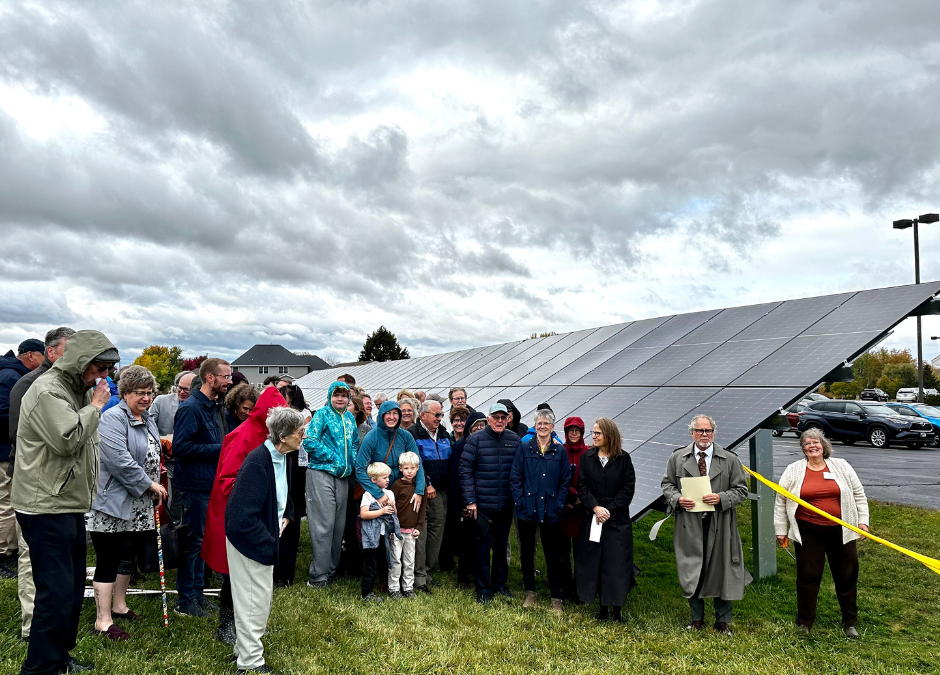
by Tiana Snyder | Oct 23, 2024 | Solar, Solar for Good
On Sunday, October 13, 2024, First Presbyterian Church hosted a ribbon-cutting ceremony to celebrate its new 139.86-kilowatt solar array. This solar project is the largest system in Marshfield, Wisconsin, and is anticipated to offset 71.8% of the church’s electrical needs. Commissioned in September, the array has already produced 18,000 kilowatt hours of electricity, enough power to completely cover its electric bill for the month, and marks the first of many months to come where the church runs purely off of clean energy.
First Presbyterian Church is part of a collaborative network, Winnebago Presbytery, and is one of 28 congregations throughout Northeastern, Wisconsin. The church’s mission is to welcome “everyone to our faith journey, denying no one, regardless of their human condition, participation in church life. We are a sanctuary where people are accepted, included, and cared for as they are. As a community based on God’s love, we strive to serve our neighbors and the world.”
First Presbyterian Church’s journey into switching to clean energy began 21 years ago when the congregation chose to incorporate geothermal energy into its facilities. This form of energy production extracts heat from the ground to warm the facilities in colder months or provide cooling during hotter months. To continue its goal of further use of clean energy, the church turned to solar to enhance its efforts. When numerous forms of energy enhancements are combined, the impact of any one form of electrical generation is exemplified.
On Sunday, the congregation, Church leaders, Northwind Solar, the Couillard Solar Foundation, and RENEW Wisconsin joined for a breakfast celebration and to hear from keynote speakers who helped get this project completed. First Presbyterian Church’s Solar Lead Gilbert Nimm, explained how transitioning to clean energy not only impacts the immediate environment in Marshfield but is ubiquitous in creating positive change at a much larger scale.
“It became clear that there were tons and tons of carbon that we could stop from going into the atmosphere that affects people around the world,” Gilbert Nimm said, “We are very proud, you should all be proud that there are no fossil fuels being used in this facility.”
This solar project was completed thanks to the generous donations of the congregation through the capital campaign, “Reach for the Sun: Harnessing God’s Gift of Light”, an anonymous donor, Focus on Energy, and Solar for Good. Northwind Solar installed 260 panels at the location, each panel generating 540 kilowatts. Of the 260 panels, 129 were granted by the Couillard Solar Foundation in partnership with RENEW Wisconsin through Solar for Good.
First Presbyterian joins a community of nonprofits across the state of Wisconsin who are committed to taking on the challenge of actively working to conserve energy. Going solar through Solar for Good is a foundational step in becoming both more conscious of energy consumption and using clean energy to serve communities. The first month of energy production for First Presbyterian Church is just the start of a long road of reduced carbon emissions and savings that can be redistributed into programming that benefits the community.
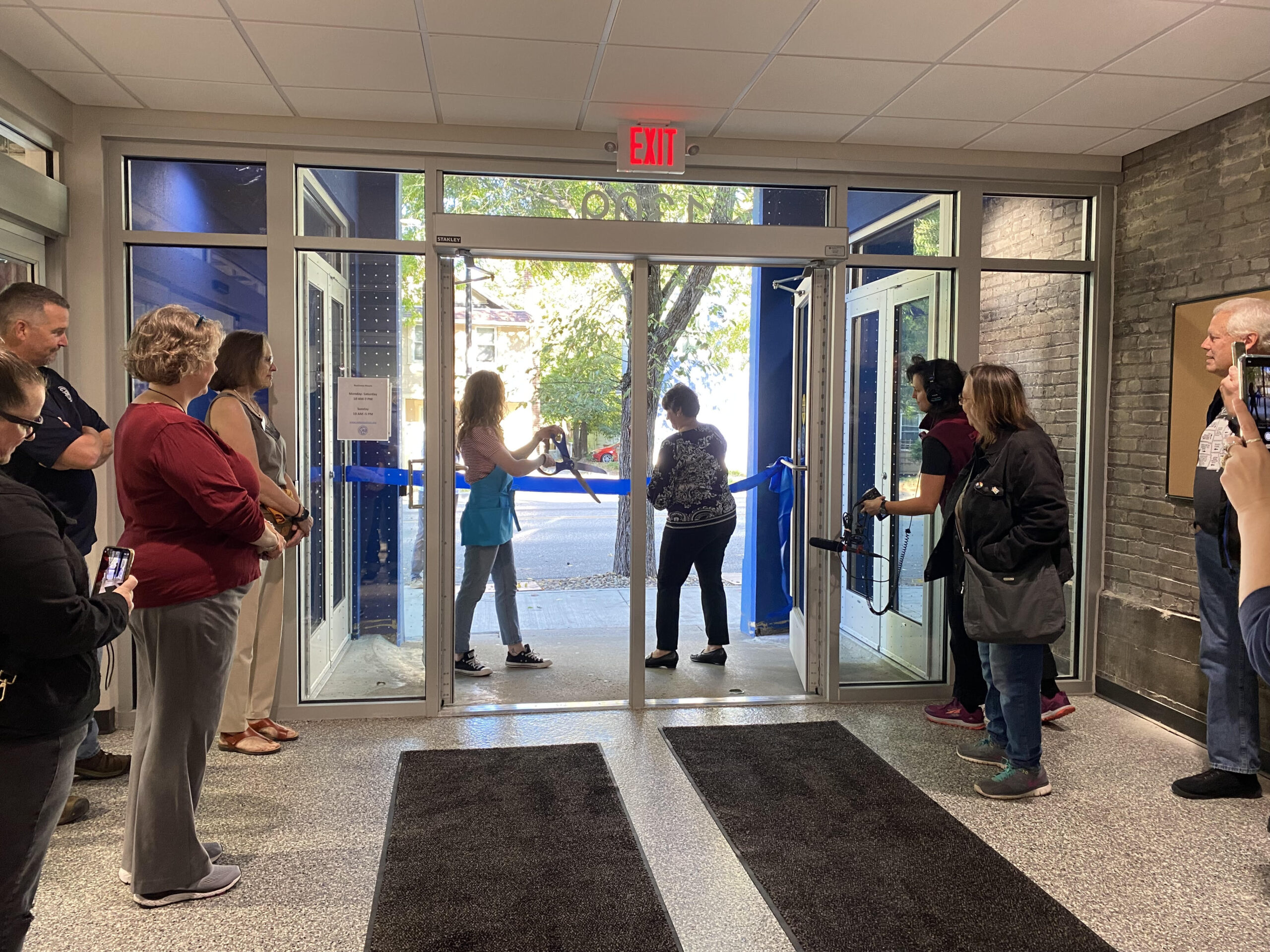
by Tiana Snyder | Oct 4, 2024 | MadiSUN, Solar, Solar for Good
On October 1, 2024, St. Vincent de Paul welcomed community members, Madison Mayor Satya Rhodes-Conway, the Couillard Solar Foundation, and RENEW Wisconsin to join in celebration of the Grand Re-opening of the Williamson Street location after the completion of their renovation. The grand re-opening showcased a refreshed retail space, a mural showcasing the history of the Williamson Street location, and a brand new 48.1-kilowatt solar system. This occasion not only marked a fresh start for St. Vincent de Paul but renewed their commitment to serving the greater Madison community through social services and environmental stewardship.
Since 1941, St. Vincent de Paul’s Williamson Street location has played a crucial role in supporting the greater Madison community by providing essential services including food, clothing, furniture, and medicine. The dedicated team has worked tirelessly to ensure that families have access to these resources, making a significant impact in many lives. Last year alone, over 3,500 families received assistance from St. Vincent de Paul.
The generous donations from the Couillard Solar Foundation’s Solar for Good grant and the City of Madison’s MadiSUN Backyard grant allow St. Vincent de Paul to save on utility expenses, contributing to a bright future for the team and the communities they serve. Their new solar array is set to generate 59,600 kWh of renewable energy each year, offsetting their utility expenses by 57 percent. These savings enable their team to focus more resources on providing and expanding social services.
The solar system, situated on the rooftop of the Social Services Suite, powers essential programs that support single adults and families in securing financial stability. These programs help community members maintain financial stability and prevent future homelessness. Additionally, the organization’s microlending programs offer assistance to people facing emergencies and provide a safety net to those in need.
Sustainability is deeply integrated throughout many aspects of the organization’s operations. By offering second-hand shopping experiences, St. Vincent de Paul not only makes vital resources accessible and affordable but also contributes to reducing waste and decreasing demand for new products. Community members who donate these goods play a crucial role in these sustainability efforts, allowing for clothes, furniture, and household items to be reused instead of ending up in landfills. The recent installation of solar panels through the Solar for Good and MadiSUN Backyard grants further exemplifies St. Vincent de Paul’s commitment to building a healthy and resilient community.
By embracing renewable energy, St. Vincent de Paul Williamson Street demonstrates a shining example of providing service to communities effectively while also prioritizing environmental responsibility. The grand re-opening gathered supporters, community leaders, and those who believe in their mission to celebrate the past, embrace the present, and look forward to a bright future that reinforces their devotion to uplift and support the Madison community.






